- School of Nursing, Changchun University of Chinese Medicine, Jilin, China
Background: Self-management behaviors, including diet control, medication adherence, blood glucose monitoring, and physical activity, are crucial for type 2 diabetes management. Neuroticism, a personality trait associated with anxiety and stress sensitivity, may significantly influence these behaviors. However, a comprehensive synthesis of evidence is lacking.
Objective: This scoping review aims to systematically map and synthesize how neuroticism has been examined in relation to self-management behaviors among adults with type 2 diabetes, and to identify recurring thematic patterns and knowledge gaps through machine learning–assisted text mining.
Methods: A scoping review was conducted in PubMed, Scopus, Web of Science, Embase, CINAHL, PsycINFO, and the Cochrane Library, covering the period from database inception to September 2025. The search strategy included keywords such as “neuroticism,” “personality traits,” “type 2 diabetes,” “self-management,” and “adherence.” We used machine learning–assisted literature mining to summarize thematic patterns across included studies. The study selection process and workflow were conducted in accordance with the PRISMA-ScR guidelines.
Results: Ten studies were included. Across the literature, neuroticism was most frequently discussed alongside blood glucose monitoring, followed by diet control, medication taking, and exercise. Psychological constructs such as anxiety, stress sensitivity, and social support were commonly co-mentioned in these discussions. Machine learning–assisted analyses highlighted recurring topics, concept clusters, and co-occurrence patterns that characterize the discourse on neuroticism and T2DM self-management.
Conclusion: This scoping review characterizes how neuroticism is positioned within the discourse on T2DM self-management behaviors and delineates prominent thematic linkages and gaps. Machine learning–assisted text mining proved useful for organizing and visualizing dispersed evidence. Findings describe patterns in the literature rather than estimating causal effects, and can inform future hypothesis-driven studies and tailored clinical inquiry.
Systematic review registration: Unique Identifier: 10.17605/OSF.IO/54NJD; publicly accessible URL: https://doi.org/10.17605/OSF.IO/54NJD.
1 Introduction
Type 2 diabetes mellitus (T2DM) is a chronic metabolic disorder characterized by insulin resistance and relative insulin deficiency, with an insidious onset, a prolonged course, and a high risk of complications (1–3). According to the International Diabetes Federation, approximately 537 million adults worldwide were living with diabetes in 2021, a number projected to increase to 643 million by 2030 (4). T2DM poses significant physical and psychological challenges for patients and imposes a heavy burden on global health systems and socioeconomic development (5). Effective management of T2DM requires sustained self-management behaviors beyond pharmacological treatment, including dietary regulation, regular physical activity, medication adherence, and blood glucose monitoring (6–8). These behaviors are fundamental to maintaining glycemic control, reducing complications, and improving quality of life. However, adherence to self-management practices remains suboptimal in clinical settings, suggesting that psychosocial and individual-level determinants warrant further exploration. Recent evidence highlights the growing importance of personality traits in shaping chronic disease management (9). Within the five-factor model of personality, neuroticism—defined as a tendency toward emotional instability, anxiety, and heightened stress reactivity—has attracted increasing attention for its potential relationship with health-related behaviors (10, 11). In patients with T2DM, higher neuroticism scores have been linked to poorer dietary regulation, irregular physical activity, inconsistent medication use, and lower frequency of glucose monitoring (12–14). Nevertheless, existing studies exhibit notable heterogeneity in design, measurement tools, and conceptual framing. The literature is fragmented and often descriptive, making it difficult to discern how the relationship between neuroticism and self-management behaviors has been examined and conceptualized across different studies. Given these inconsistencies, a scoping review is warranted to systematically map and synthesize how neuroticism has been studied in relation to self-management among adults with T2DM. Unlike systematic reviews that seek to quantify effect sizes or evaluate evidence quality, a scoping review aims to identify the breadth, scope, and conceptual patterns of existing research. This approach allows for the integration of diverse methodologies and provides a descriptive overview of emerging themes and research gaps.
To enhance transparency and analytical depth, this review incorporates machine learning–assisted text mining to identify recurring topics, co-occurrence patterns, and thematic linkages within the existing literature. By visualizing how neuroticism is positioned within discussions of T2DM self-management, this review seeks to establish a structured knowledge framework that highlights areas of convergence and fragmentation, thereby informing future hypothesis-driven research and tailored clinical strategies.
2 Methods
2.1 Study design
This study was conducted as a scoping review and was designed and reported in accordance with the PRISMA-ScR guidelines (15). The protocol was registered with the Open Science Framework1 and is publicly accessible. Consistent with its scoping review methodology, the study aimed to map the breadth and conceptual structure of existing evidence rather than quantitatively synthesize effect sizes or assess the quality of individual studies.
2.2 Research questions
An initial exploratory search of the literature was undertaken to refine the research question and clarify the scope of inquiry. The primary objective of this review was to map and synthesize how neuroticism has been examined in relation to self-management behaviors among adults with type 2 diabetes mellitus (T2DM). Based on this preliminary search, the following objectives were established: (1) Identify existing studies addressing neuroticism within the context of T2DM self-management; (2) summarize how neuroticism has been situated across key domains of self-management, including dietary control, physical activity, blood glucose monitoring, and medication adherence; (3) and delineate recurring thematic patterns, conceptual linkages, and research gaps in the current evidence base. Accordingly, the overarching question guiding this review was as follows: “How has neuroticism been examined and discussed in relation to self-management behaviors among adults with type 2 diabetes mellitus?”
2.3 Search strategy
Following the PRISMA-ScR reporting guidelines and the Arksey and O’Malley framework (15, 16), a comprehensive search was conducted to identify studies examining the relationship between neuroticism and self-management behaviors among patients with type 2 diabetes mellitus (T2DM). The databases searched included PubMed, Scopus, Web of Science, Embase, CINAHL, PsycINFO, and the Cochrane Library, covering all records from database inception to 8 September 2025. The search strategy combined controlled vocabulary (MeSH terms) and free-text keywords, including “neuroticism,” “personality traits,” “self-management,” “type 2 diabetes mellitus,” “dietary control,” “physical activity,” “blood glucose monitoring,” and “medication adherence.” Boolean operators (AND, OR), truncation symbols (“”*), and field tags [Title/Abstract] were applied to ensure a comprehensive search. The complete PubMed search syntax is presented in Supplementary material S1. In addition, the reference lists of included studies and relevant reviews were manually screened to ensure comprehensive coverage of eligible literature.
2.4 Eligibility criteria
2.4.1 Inclusion criteria
Inclusion criteria included studies that include patients diagnosed with type 2 diabetes mellitus (T2DM) as the study population; studies examining neuroticism and its influence on self-management behaviors, including dietary control, physical activity, blood glucose monitoring, and medication adherence; original quantitative research (cross-sectional, cohort, or interventional designs) or mixed-method studies; publications available in English or Chinese; and studies providing full-text access with sufficient data for analysis.
2.4.2 Exclusion criteria
Exclusion criteria included studies involving animals, case reports, reviews, or commentaries; studies that did not examine neuroticism or self-management behaviors; duplicate publications, with the most recent or most complete data retained; studies lacking full-text access or with substantial missing data; and studies that did not include patients with type 2 diabetes mellitus (T2DM).
2.5 Study selection
All the retrieved records were imported into EndNote 20 for de-duplication. Two independent reviewers screened titles and abstracts according to predefined inclusion and exclusion criteria. Before formal screening, both reviewers underwent calibration training and pilot testing to ensure consistency in the application of the criteria. Inter-rater agreement was evaluated on a random sample and exceeded 90%, indicating satisfactory consistency. Any discrepancies were resolved through discussion and, when necessary, adjudication by a third reviewer.
2.6 Data extraction
The data extracted comprised the following elements: authors, year of publication, country of study, study design, sample size, participant characteristics, instruments employed to measure neuroticism, instruments used to evaluate self-management, reported levels of neuroticism, reported levels of self-management behaviors, and principal findings. All extracted data were systematically collated using a standardized data extraction form to ensure consistency and to facilitate subsequent analysis and tabular presentation.
2.7 Data analysis
Data analysis integrated traditional descriptive synthesis with machine learning-assisted text mining to explore thematic patterns and conceptual linkages across the included literature. The workflow was designed to enhance transparency, reproducibility, and interpretability.
2.7.1 Text preprocessing
All textual data were processed through a standardized natural language processing (NLP) pipeline that included tokenization, lemmatization, and stop-word removal. Sentences containing reference lists, numeric identifiers (DOIs), or author information were excluded to ensure semantic clarity. Tokens shorter than three characters or containing numerals were filtered out. Common academic stop-words such as et al. and doi were removed. The final corpus comprised 1,933 valid sentences and 23,738 effective tokens.
2.7.2 Topic modeling with LDA
Latent Dirichlet Allocation (LDA) was used to uncover latent thematic structures within the corpus. Candidate topic numbers (K = 2–10) were compared using coherence scores, and the optimal model (K = 5, coherence = 0.4407) was selected. Vocabulary thresholds were applied (minimum frequency ≥ 2, maximum document coverage ≤ 80%), resulting in 1,700 retained tokens. LDA was implemented using the gensim package (v4.3) in Python 3.10, with default hyperparameters (α = 0.1, β = 0.01). Each topic was manually reviewed and labeled according to its dominant keywords and representative sentences.
2.7.3 Semantic embedding and clustering with BERT
To capture deeper contextual semantics, the bert-base-uncased pretrained model from the transformers library (v4.30) was applied to encode each sentence into 768-dimensional embeddings. K-means clustering was used to identify latent semantic clusters, with the optimal number (K = 3) determined via the elbow method and silhouette coefficient (peak = 0.0805). Dimensionality reduction for visualization was performed using principal component analysis (PCA). BERT was selected for its capacity to represent contextual and syntactic nuance beyond surface-level word co-occurrence.
2.7.4 Keyword co-occurrence network
A domain-specific co-occurrence network was constructed to visualize relationships among key terms related to neuroticism, self-management, dietary control, medication adherence, blood glucose monitoring, and physical activity. TF-IDF weighting and cosine similarity were used to quantify the connection strengths between keywords. Community detection via modularity optimization was applied to identify conceptual clusters and central nodes.
2.7.5 Software and version control
All analyses were performed in Python 3.10 using the following packages: NLTK 3.8 for text preprocessing, gensim 4.3 for topic modeling, transformers 4.30 for BERT encoding, scikit-learn 1.3 for clustering and PCA, and NetworkX 3.1 for network visualization. All scripts and parameters were archived for reproducibility.
2.7.6 Quality control and manual validation
Two independent reviewers examined the outputs of LDA and BERT analyses to ensure consistency between automatic and manual interpretations. Discrepancies were resolved through discussion and consensus, and, where necessary, models were iteratively refined. Manual inspection of representative sentences was performed for each theme to confirm semantic validity and minimize algorithmic bias.
2.7.7 Rationale for model selection
The choice of LDA and BERT was guided by the scoping review’s goal of mapping thematic breadth rather than quantifying causal relationships. LDA was used to identify probabilistic topic structures based on lexical co-occurrence, providing an interpretable overview of how neuroticism and self-management are discussed across studies. In contrast, BERT embeddings capture contextual semantics, allowing the identification of subtle conceptual proximity beyond surface word patterns. The combination of these two methods offers complementary perspectives—LDA reveals macro-level thematic distributions, while BERT highlights micro-level semantic relationships—thereby enhancing both the depth and transparency of the evidence mapping process.
2.8 Methodological considerations and quality appraisal
Following the methodological guidance of PRISMA-ScR and the JBI Manual for Evidence Synthesis, this review did not include a formal quality appraisal or risk-of-bias assessment. As a scoping review, its purpose was to map and describe the research landscape on neuroticism and self-management in type 2 diabetes, rather than to evaluate methodological rigor or synthesize effect sizes. To ensure transparency, descriptive information on study design, sample characteristics, measurement tools, and analytical approaches was summarized in the Results section. This approach aligns with international standards for scoping reviews and maintains consistency between the study’s exploratory aim and methodological framework.
3 Results
The initial search identified 699 records. After removing duplicates, 664 records remained, of which 10 studies met the inclusion criteria and were ultimately included. The detailed study selection process is shown in Figure 1.
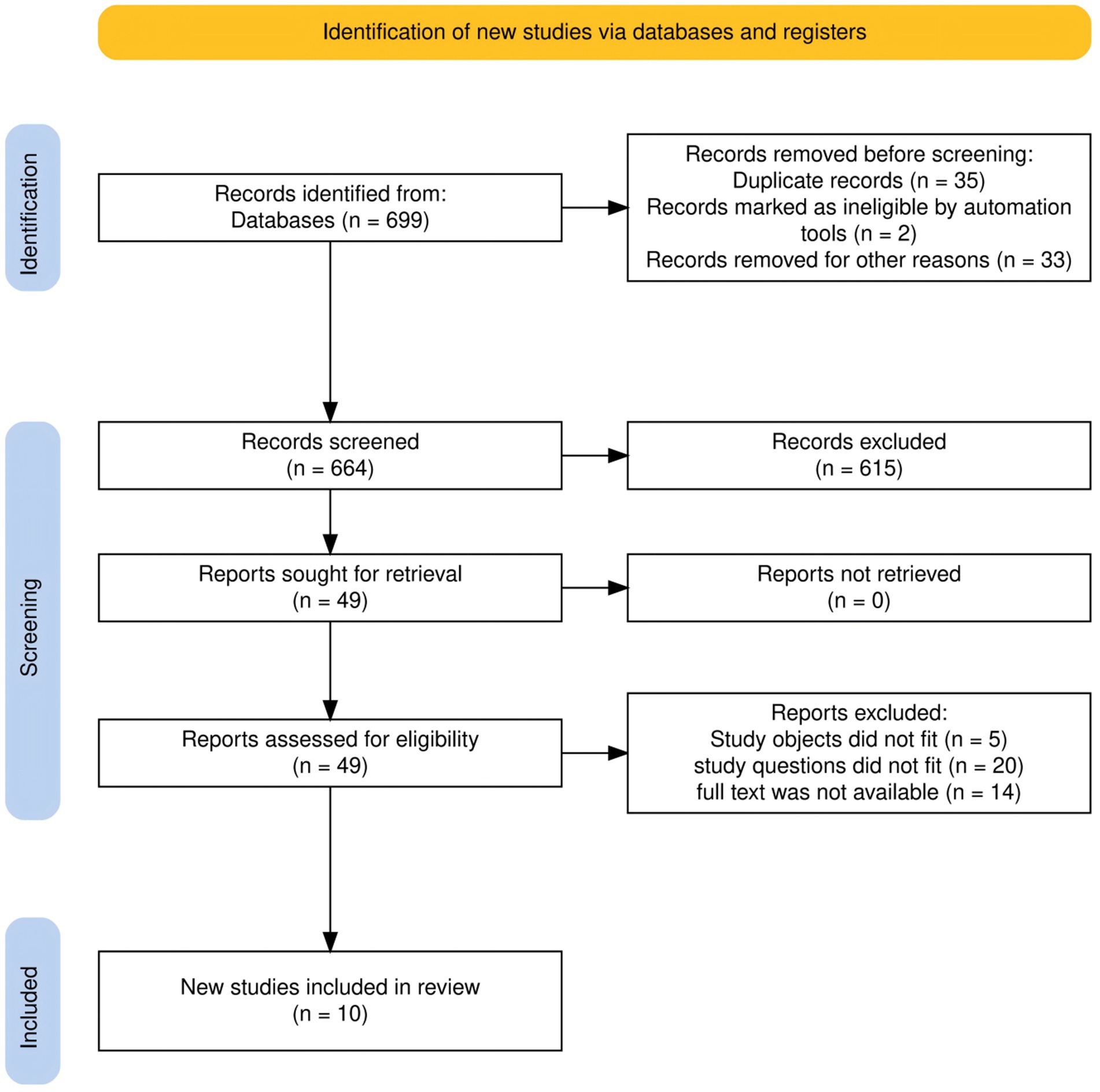
Figure 1. Literature selection flowchart illustrates the identification, screening, eligibility assessment, and inclusion stages in the scoping review on the relationship between neuroticism and self-management behaviors in adults with type 2 diabetes mellitus (Scoping review, global, 2025).
3.1 Characteristics of the included studies
A total of 10 studies were included in this scoping review, originating from 6 countries: China (n = 3), the United States (n = 2), Mexico (n = 1), Bosnia and Herzegovina (n = 1), Iran (n = 2), and Australia (n = 1). The included studies comprised eight cross-sectional designs, one prospective cohort, and one longitudinal study. The methodological characteristics, sample features, and measurement tools of each study are summarized in Table 1.
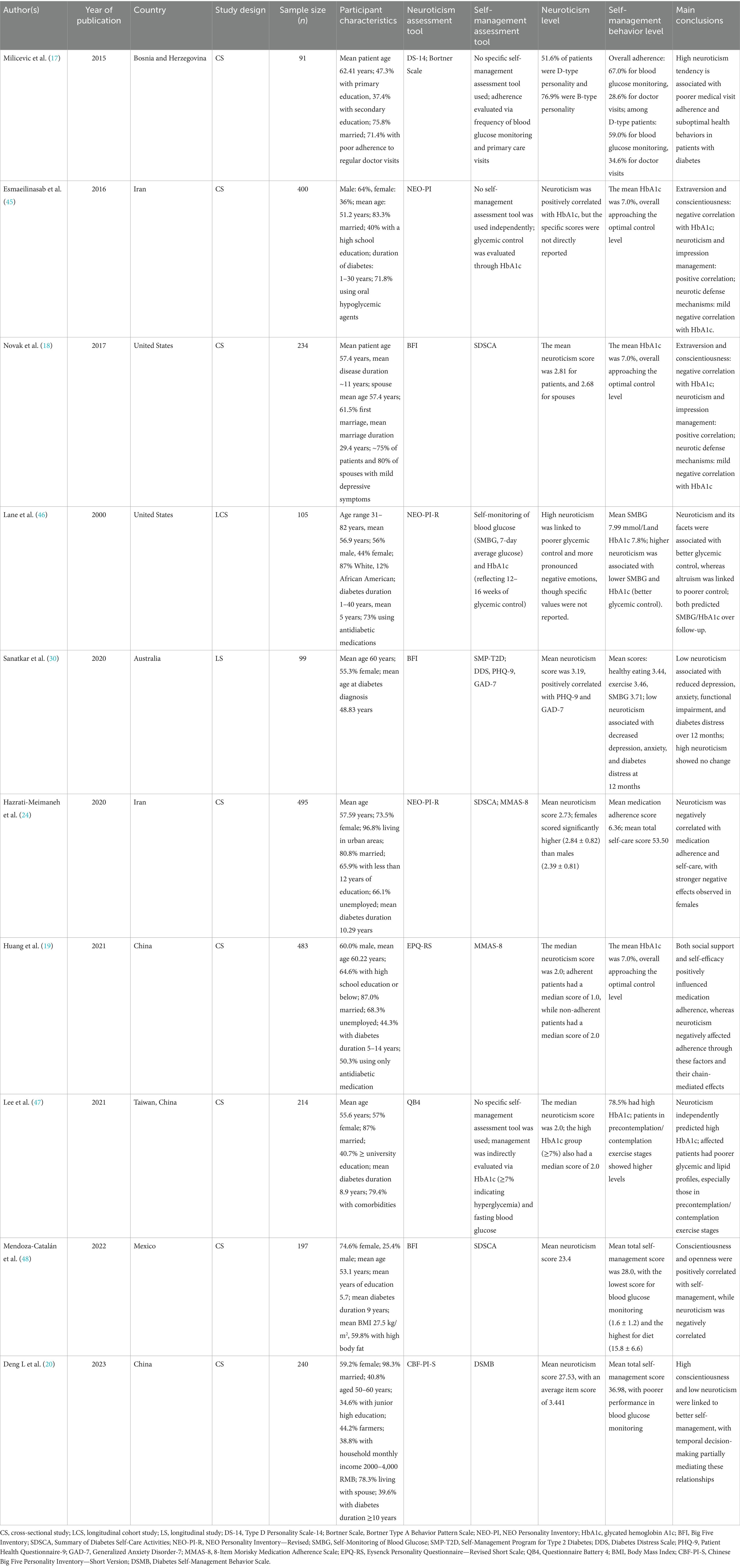
Table 1. Key characteristics of studies included in the scoping review of the influence of neuroticism on self-management behaviors in patients with type 2 diabetes (Scoping review, global, 2025).
3.2 Keyword frequency analysis and identification of core concepts
3.2.1 Distribution patterns of high-frequency terms
High-frequency keyword analysis showed that “diabetes” (n = 483), “personality traits” (n = 433), and “patient population” (n = 390) were the most frequently discussed terms, reflecting the general research focus and population scope. The term “neuroticism” appeared 306 times, highlighting its central thematic role. Among self-management–related terms, “adherence” (n = 284), “medication” (n = 194), and “self-management” (n = 125) were common. Psychosocial factors such as “social support” and “depression” were frequently co-mentioned, suggesting that emotional and social dimensions are prominent in self-management discourse. These co-occurrence frequencies describe discussion prominence rather than empirical association. Results are visualized in Figure 2.
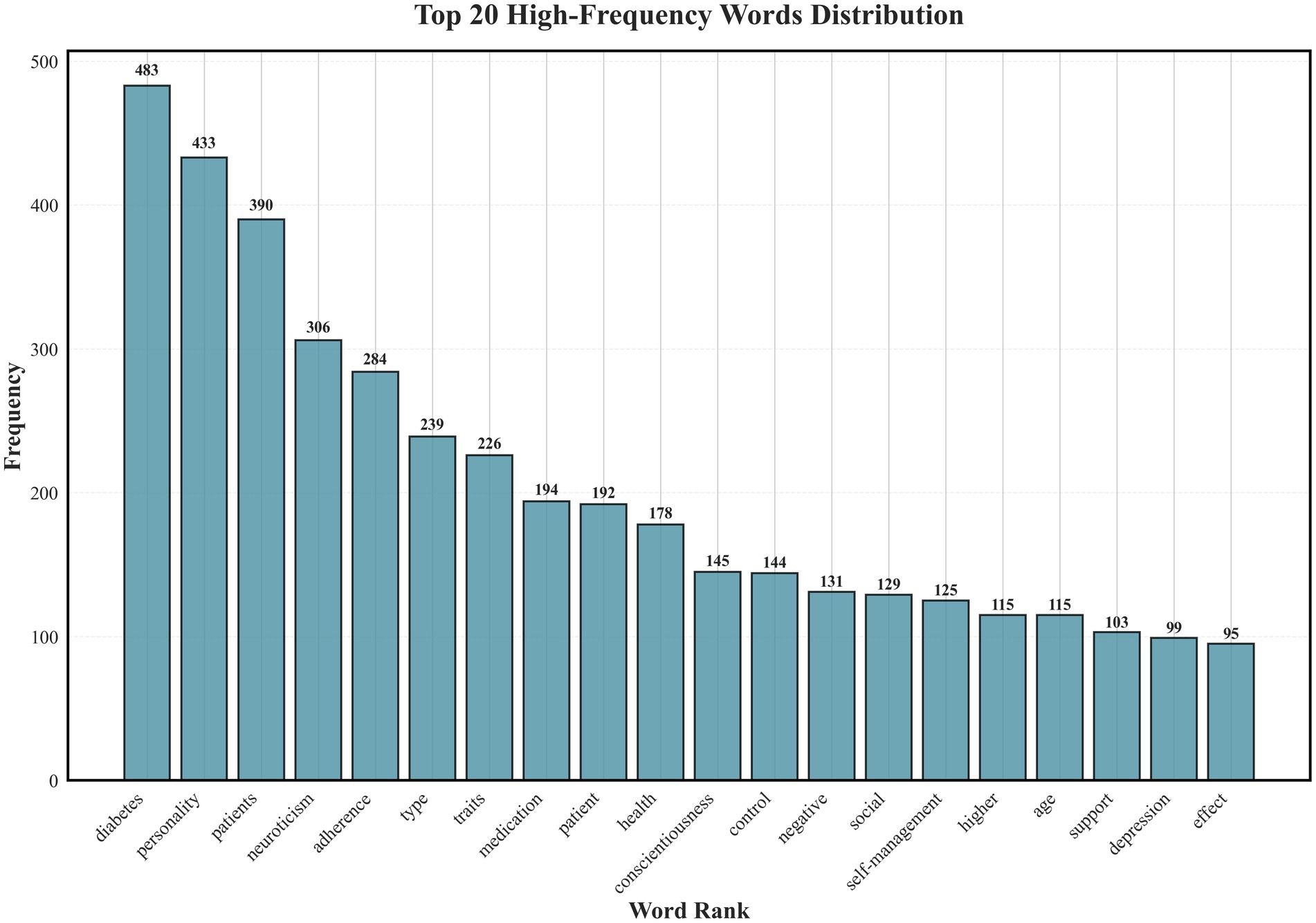
Figure 2. High-frequency keyword analysis depicts core concepts discussed in studies on the relationship between neuroticism and self-management behaviors in adults with type 2 diabetes mellitus (Scoping review, global, 2025).
3.2.2 Co-mention patterns of major high-frequency terms
Co-mention analysis indicated that the most frequently co-mentioned pairs were “adherence–medication” (280 occurrences), “personality–traits” (240), and “diabetes–type” (234). Other notable co-mentions included “social–support” (179), “diabetes–personality” (165), “personality–type” (157), “adherence–social” (150), and “adherence–support” (146), suggesting a prominent thematic linkage between social factors and adherence. Neuroticism-related co-mentions were also salient—“medication–neuroticism” (131), “neuroticism–social” (115), and “neuroticism–support” (112)—highlighting the discursive proximity of neuroticism to medication and social-support themes across the literature. These frequencies characterize patterns of discussion rather than statistical or causal relationships. Detailed results are shown in Figure 3.
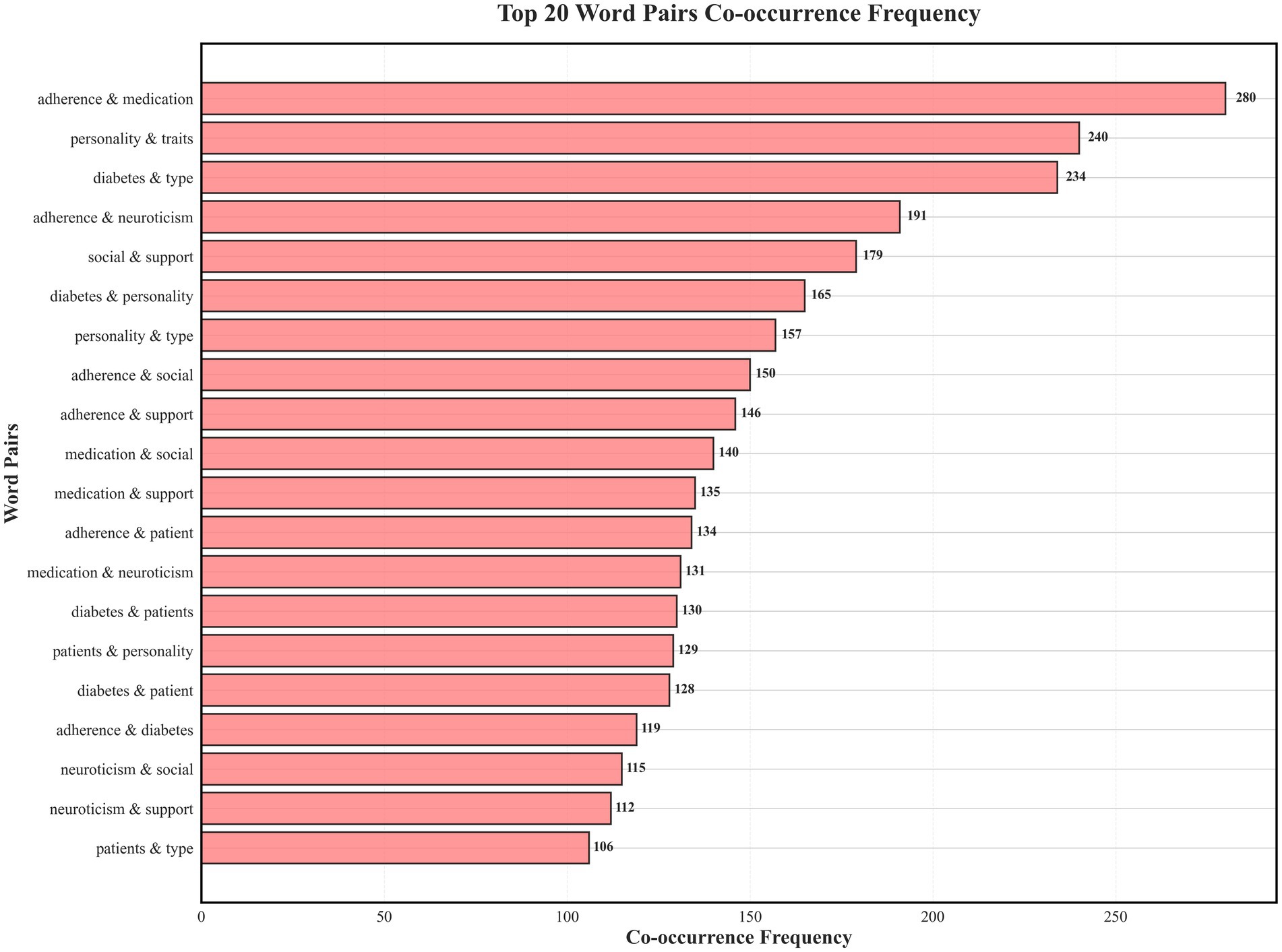
Figure 3. Co-mention analysis of major high-frequency terms illustrates core thematic linkages in studies on neuroticism and self-management behaviors in adults with type 2 diabetes mellitus (Scoping review, global, 2025).
3.3 Thematic structure analysis
3.3.1 Optimal number of topics
The optimization of topic coherence in LDA modeling indicated that a five-topic solution (K = 5) achieved the best coherence score (0.4407). This configuration provided balanced interpretability and model stability, capturing conceptual diversity within the literature on neuroticism and diabetes self-management. Thematic structures are illustrated in Figure 4.
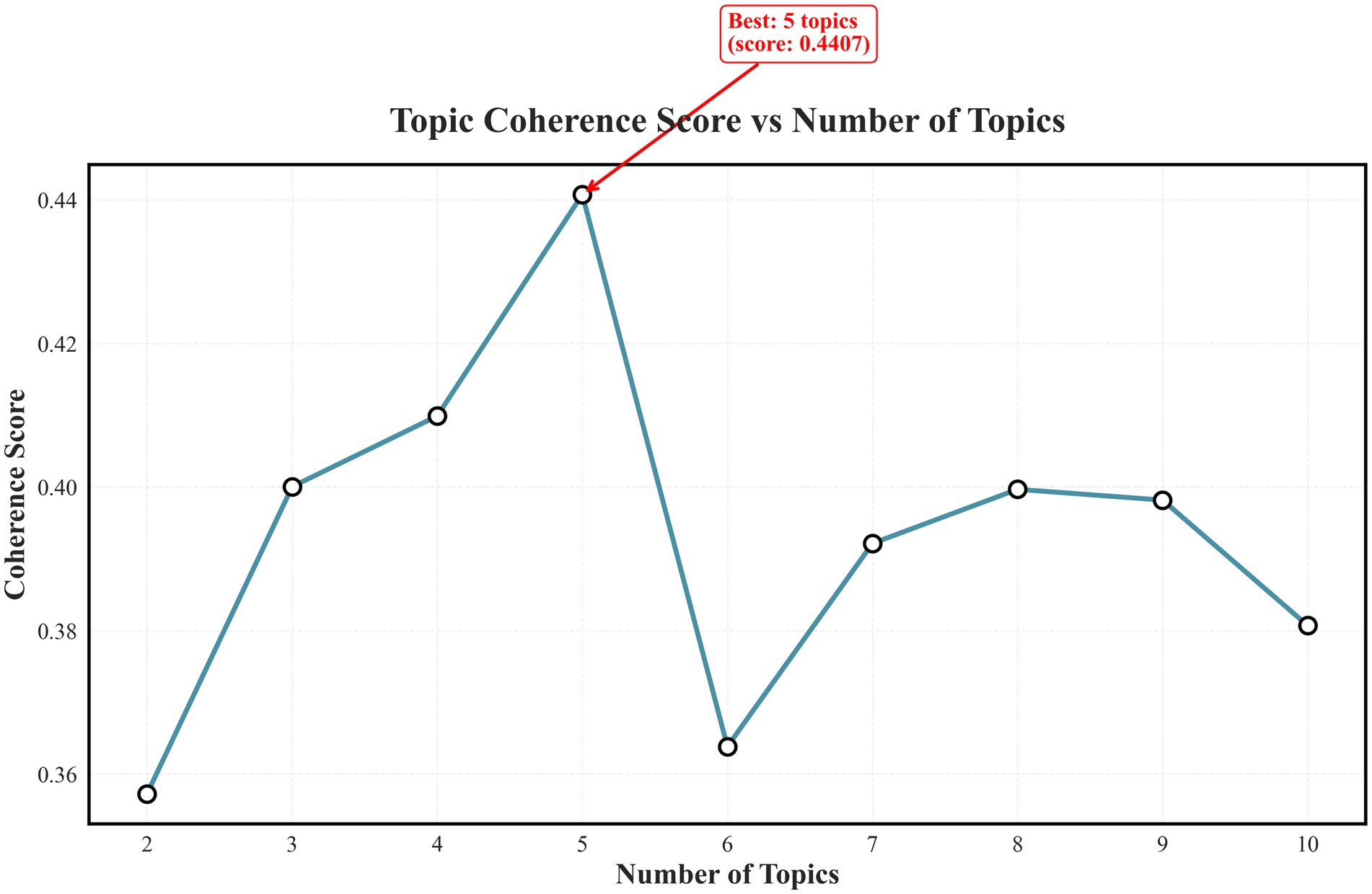
Figure 4. Optimization of topic number shows the five-topic solution representing major discussion themes in the scoping review on neuroticism and self-management (Scoping review, global, 2025).
3.3.2 Visualization of thematic terms
The visualization of thematic terms produced five discernible topic clusters, each representing a distinct domain of discussion within the literature. Topic 1 was primarily associated with statistical terminology, including words such as “level,” “score,” “variable,” and “measurement,” reflecting methodological discourse. Topic 2 focused on foundational personality constructs, characterized by the frequent use of “personality traits,” “diabetes,” “type,” and “characteristics.” Topic 3 encompassed emotional and cognitive aspects, featuring terms such as “patients,” “negative,” “emotions,” and “stress.” Topic 4 concentrated on behavioral adherence and self-management, with commonly co-mentioned terms like “adherence,” “diet,” “exercise,” and “blood glucose monitoring.” Topic 5 reflected comparative personality discussions, where “neuroticism,” “conscientiousness,” and “extraversion” frequently appeared together. Collectively, these clusters depict how discussions of neuroticism are distributed across methodological, emotional, and behavioral domains in the existing literature. The visualization of these thematic structures is presented in Figure 5.
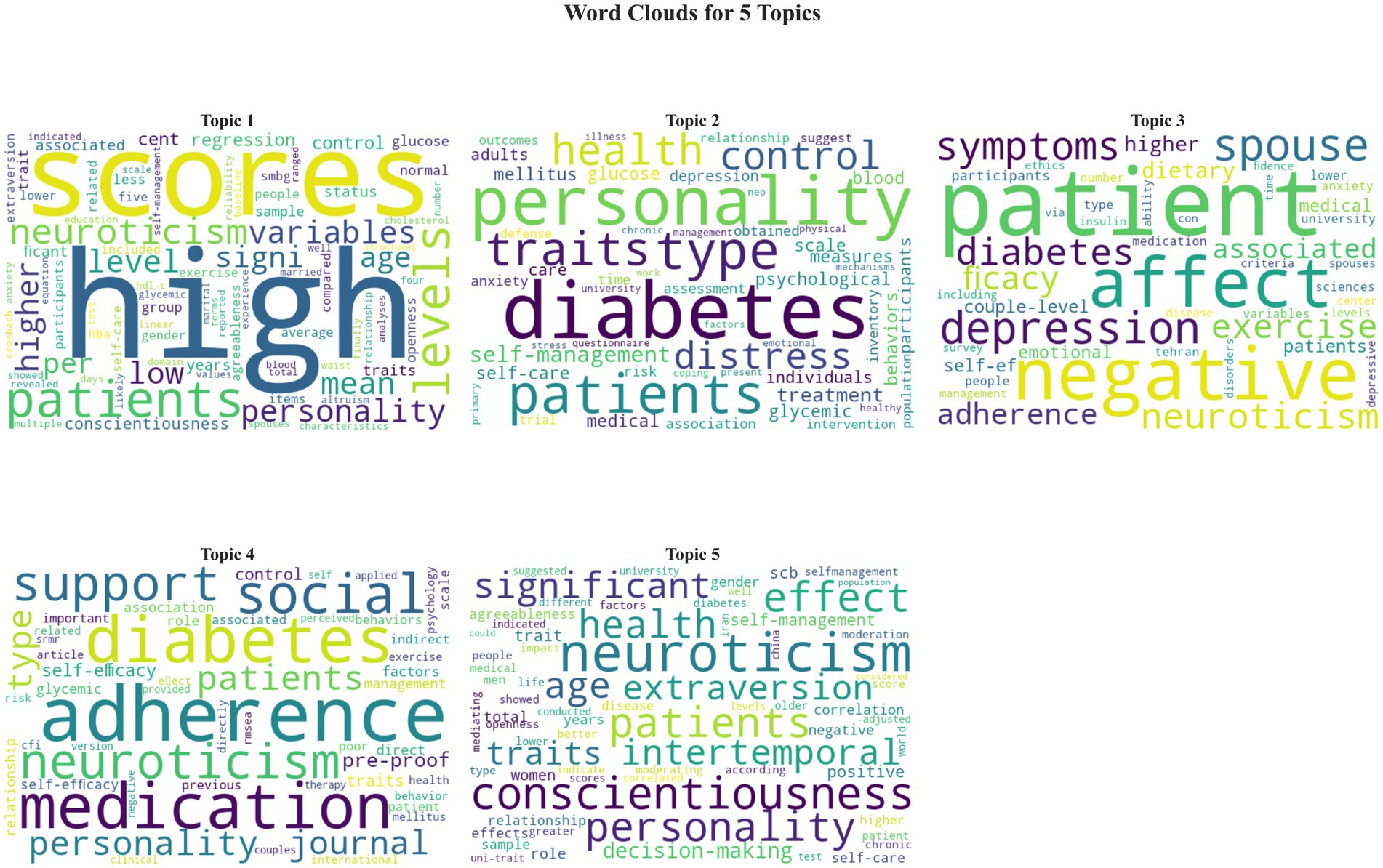
Figure 5. Visualization of thematic terms depicts topic clusters discussed in studies on neuroticism and self-management behaviors among adults with type 2 diabetes mellitus (Scoping review, global, 2025).
3.3.3 Detailed distribution of thematic term weights
The analysis of term weights across topics revealed a hierarchical distribution of thematic content within the literature. In Topic 4, the term “adherence” (0.0506) had the highest frequency weight, indicating that adherence-related terminology appeared more often within behavioral management discussions. Topic 2 displayed comparatively higher weights for “diabetes” (0.0461) and “personality traits” (0.0421), which were recurrently used in conceptual and theoretical contexts. Topic 3 included “patients” (0.0392), “negative” (0.0223), and “emotions” (0.0193), representing terms that occurred more frequently in references to emotional and cognitive aspects. In Topic 5, “neuroticism” (0.0240) and “conscientiousness” (0.0232) showed similar frequency weights, reflecting their repeated co-mention in discussions of comparative personality characteristics. Collectively, these distributions describe the relative prominence of thematic terms across research domains, outlining the structural organization of topic-specific discourse rather than inferential relationships. Detailed results are presented in Figure 6.
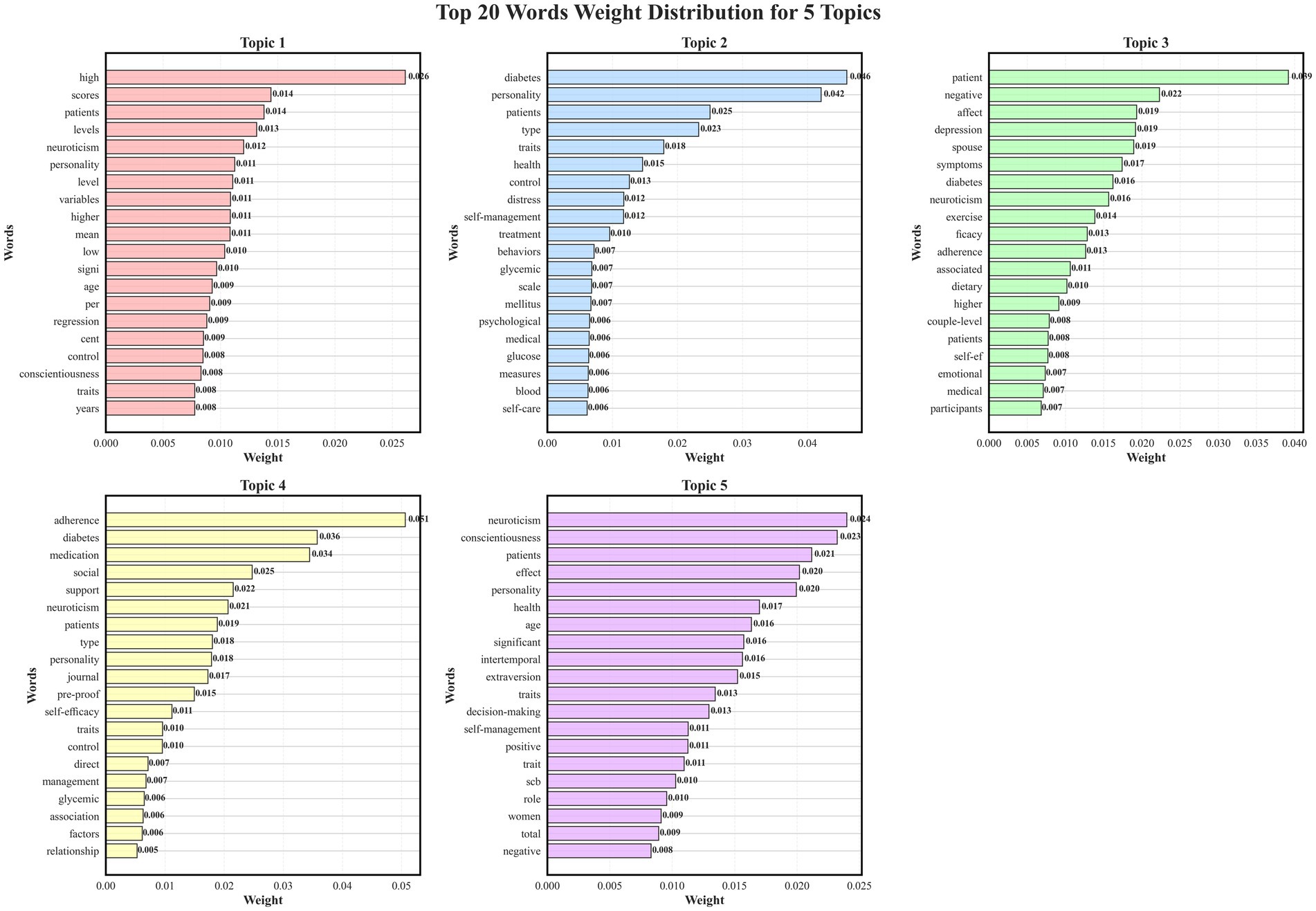
Figure 6. Distribution of thematic term weights depicts the hierarchical arrangement of topics in studies on neuroticism and self-management behaviors among adults with type 2 diabetes mellitus (Scoping review, global, 2025).
3.4 Keyword co-occurrence network analysis
The keyword co-occurrence network showed that the “neuroticism” cluster connected emotional terms (“stress,” “anxiety,” “negative affect”) with behavioral terms (“adherence,” “self-management”). This highlights neuroticism’s role as a semantic bridge linking emotional reactivity and behavioral regulation within research discourse. The visualization is shown in Figure 7.
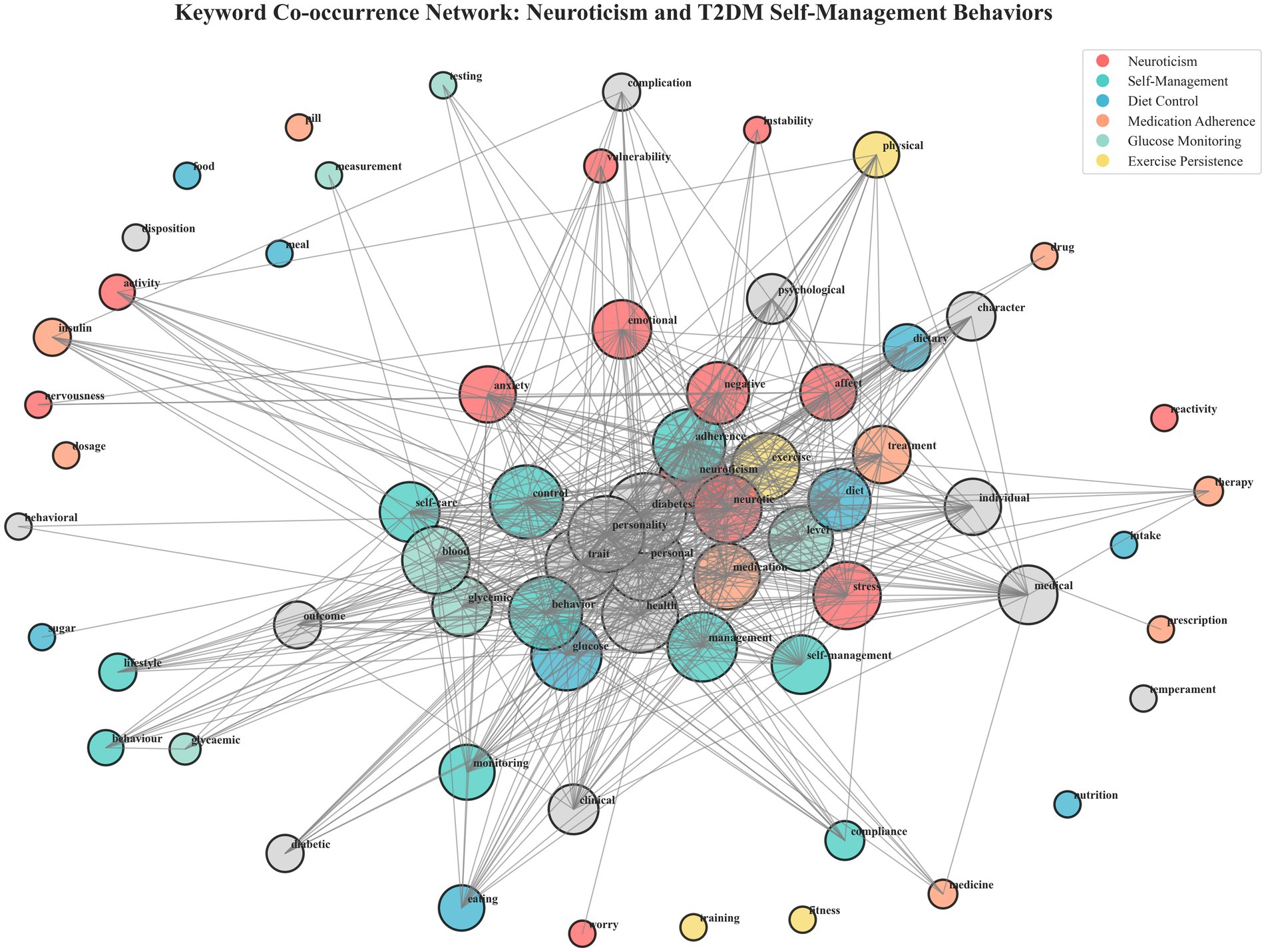
Figure 7. Keyword co-occurrence network illustrates the semantic relationships between neuroticism, emotional constructs, and self-management discussions in adults with type 2 diabetes mellitus (Scoping review, global, 2025).
3.5 Thematic mapping of neuroticism in self-management discussions
3.5.1 Co-occurrence patterns of neuroticism and self-management behaviors
Across the literature, neuroticism was most frequently co-mentioned with general self-management behaviors (209 times), followed by blood-glucose monitoring (102), dietary control (67), medication adherence (60), and exercise maintenance (53). These frequencies indicate differences in research emphasis rather than measured associations. Neuroticism was also often co-mentioned with “diabetes outcomes” (197) and “conscientiousness” (166), reflecting its comparative role in personality research. Figure 8 illustrates these thematic connections.
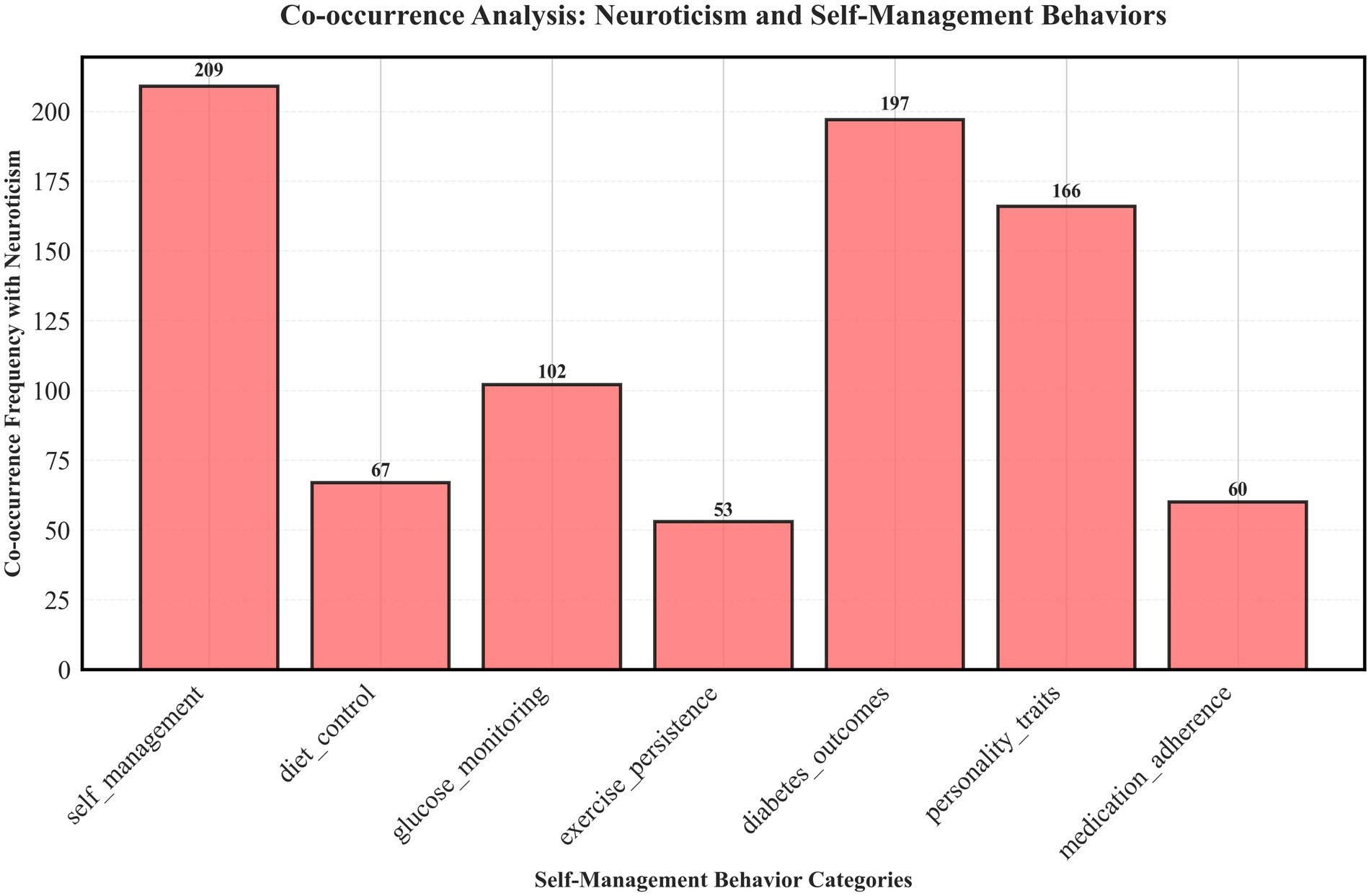
Figure 8. Co-mention patterns between neuroticism and self-management themes across studies (Scoping review, global, 2025).
3.5.2 Conceptual knowledge framework
Based on LDA and BERT analyses, a conceptual framework (Figure 9) was constructed to visualize thematic linkages between neuroticism and self-management-related constructs. The framework was automatically derived from topic co-mention frequencies and semantic similarities. Arrows indicate semantic directionality within the discussions rather than causal or statistical effects. The model demonstrates how neuroticism connects with behavioral domains (diet, medication, exercise, monitoring) and psychological correlates (stress, emotion, coping), reflecting the structural organization of existing research.
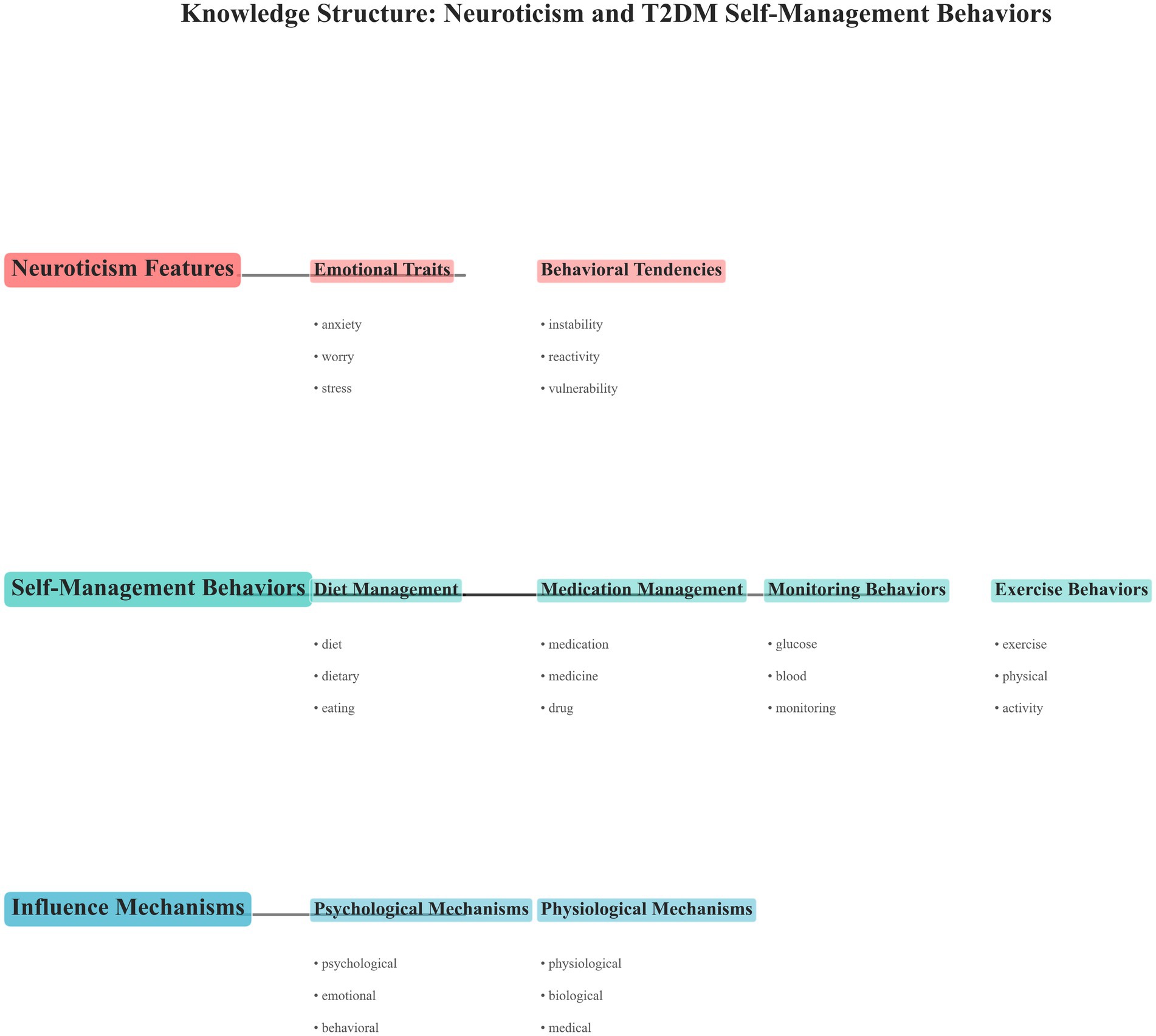
Figure 9. Conceptual framework visualizes thematic linkages between neuroticism and self-management discussions in adults with type 2 diabetes mellitus (Scoping review, global, 2025).
4 Discussion
4.1 Patterns of discussion on neuroticism in relation to self-management behaviors among patients with type 2 diabetes
Multi-level text-mining analyses indicated that neuroticism was the most frequently discussed personality construct in the literature addressing self-management behaviors among patients with type 2 diabetes mellitus (T2DM). Across the studies, neuroticism was most often discussed in conjunction with blood glucose monitoring, followed by dietary control, medication adherence, and physical activity (17). Rather than suggesting stronger statistical associations, this distribution reflects the frequency and prominence of neuroticism-related discourse in these behavioral domains. Within the reviewed literature, neuroticism was frequently co-mentioned with psychosocial concepts such as anxiety, stress sensitivity, social support, and self-efficacy (18–20). These co-occurrences suggest that neuroticism has been positioned as a psychological interpretive construct—a framework through which emotional and behavioral variability in self-management is discussed. In this context, neuroticism serves as a recurring theme linking emotional instability to self-regulatory challenges in diabetes care, illustrating how emotional reactivity and perceived stress are discussed in relation to patient engagement and self-management. Importantly, several studies contextualized neuroticism by comparing it with other personality dimensions, most notably conscientiousness, agreeableness, and extraversion (21–23). These comparative discussions framed conscientiousness as representing behavioral discipline and goal orientation, while neuroticism was described as reflecting emotional vulnerability and response sensitivity. Such comparisons help delineate the conceptual boundaries of neuroticism, highlighting its distinctive theoretical position within the personality–behavior discourse. Together, these thematic patterns suggest that neuroticism is not only a frequently discussed topic but also serves as a contrastive reference point for understanding the broader personality dynamics involved in diabetes self-management.
4.2 Discussion patterns of neuroticism across domains of self-management behaviors in type 2 diabetes
4.2.1 Neuroticism and dietary control
Across the included studies, neuroticism was frequently discussed in the context of dietary management, ranking second in prominence among the four domains of self-management behaviors. The literature generally describes individuals with higher neuroticism as exhibiting complex psychological responses when making dietary decisions. On the one hand, such individuals were often portrayed as having heightened health awareness and increased attention to dietary regulation; on the other hand, emotional instability and sensitivity to stress were frequently noted in association with behaviors such as emotional eating, which may undermine consistent dietary management (18, 20, 24). Overall, these findings in the literature indicate that dietary regulation is commonly discussed through a psychological and emotional interpretive framework, in which neuroticism functions as a descriptive construct linked to emotional reactivity, rather than a directly measured determinant of behavior (25–28).
4.2.2 Neuroticism and medication adherence
In the reviewed evidence, medication adherence appeared less frequently in discussions of neuroticism compared with other self-management behaviors. Neuroticism was typically described as a contextual factor rather than a principal determinant of medication adherence. The literature emphasized that adherence behaviors are largely discussed in relation to external contextual variables, such as healthcare professional guidance, medication side effects, economic conditions, and family support (19, 24, 29). Within these discussions, neuroticism was occasionally co-mentioned with psychosocial constructs such as trust, self-efficacy, and treatment perception, suggesting its role as an interpretive element in understanding variability in adherence behavior, rather than as an independent causal variable.
4.2.3 Neuroticism and blood glucose monitoring
Blood glucose monitoring was the self-management behavior most prominently discussed in connection with neuroticism across the included studies. The literature often framed this relationship within the context of health vigilance, risk perception, and monitoring frequency (19, 24, 30). Individuals characterized by higher neuroticism were frequently described as showing increased attentiveness to glucose fluctuations and greater sensitivity to health uncertainty, which was discussed as part of a broader psychological sensitivity framework. The operational simplicity and quantifiable feedback nature of glucose testing were also mentioned as potential reasons why monitoring behaviors are more extensively discussed in connection with neuroticism (31–33). Collectively, these patterns in the literature highlight that blood glucose monitoring is the domain where discussions of neuroticism appear most prominently, often in association with emotional vigilance and reassurance-seeking tendencies, rather than through empirical causal examination.
4.2.4 Neuroticism and exercise maintenance
Among the four domains of self-management, physical activity and exercise appeared least frequently in discussions involving neuroticism. When addressed, the literature often related neuroticism to motivation, self-regulation, and emotional barriers, describing it as a psychological attribute that may contribute to difficulties in sustaining exercise behaviors (18, 20). However, these interpretations were largely descriptive, focusing on theoretical or observational discussions rather than empirical confirmation. The relative scarcity of this theme in the reviewed literature may reflect the methodological challenges associated with assessing long-term exercise adherence within personality-related studies. As such, neuroticism was discussed primarily within the broader context of emotional stability and behavioral consistency, rather than as a quantitatively assessed predictor (34–36).
4.3 Thematic reflections and practical relevance
Within the reviewed literature, discussions linking neuroticism to self-management behaviors among adults with type 2 diabetes have largely centered on psychological adaptation, emotional regulation, and contextual support systems. Neuroticism is frequently discussed in relation to emotional instability, stress reactivity, and self-efficacy, particularly within the domains of dietary regulation, medication use, blood glucose monitoring, and physical activity (37–39). Rather than presenting neuroticism as a direct determinant of behavior, studies commonly frame it as a personality-based context shaping how patients perceive, interpret, and maintain self-management behaviors. At the public health level, this discourse reflects a growing recognition of personality-informed strategies in chronic disease prevention and management. Several studies emphasized the role of social and community resources—such as communication with healthcare providers, family engagement, and peer support—in moderating the challenges associated with neurotic tendencies (40–42). These themes align with the broader goals of public health practice, which emphasize psychosocial determinants of health, health literacy, and individualized behavioral interventions. From a systems perspective, integrating personality traits into chronic disease management frameworks may enhance population-level interventions by promoting patient-centered education, digital health engagement, and community-based support initiatives (43, 44). Collectively, the reviewed discussions suggest an emerging interdisciplinary convergence between psychological science and public health, highlighting the importance of addressing personality diversity to support equitable and sustainable diabetes self-management.
4.4 Added value of machine learning–assisted text mining
In this scoping review, the integration of machine learning–assisted text mining offered methodological advantages that complemented conventional manual synthesis. Techniques such as natural language processing (NLP), latent Dirichlet allocation (LDA) topic modeling, and BERT-based semantic clustering enabled the identification of latent thematic structures and semantic linkages that might not have been detected through traditional narrative synthesis. The computational analysis revealed implicit connections between neuroticism, psychosocial constructs, and specific self-management behaviors—such as the frequent co-mentioning of neuroticism with blood glucose monitoring and social support—that were not consistently highlighted across studies. Moreover, the convergence between algorithmic outputs and manual thematic coding enhanced the transparency and reproducibility of the review process by reducing subjective bias. Although the number of included studies was limited (n = 10), the application of machine learning was methodologically justified, as it facilitated structured visualization of thematic density and relational patterns within a heterogeneous evidence base. Rather than replacing traditional qualitative synthesis, machine learning served as an augmentative tool, providing a data-driven mapping of conceptual relationships and highlighting underexplored intersections within the literature. This approach illustrates how hybrid human–machine methodologies can enrich scoping reviews by systematically organizing dispersed evidence and supporting more nuanced thematic interpretation.
4.5 Limitations
This review was conducted as a scoping review and therefore did not aim to quantify effect sizes or perform subgroup comparisons. Its purpose was to systematically map and describe how neuroticism has been examined in relation to self-management behaviors among adults with type 2 diabetes. The observed variations in research design, population characteristics, and measurement instruments reflect the conceptual and methodological diversity within this field rather than statistical heterogeneity. In accordance with the PRISMA-ScR guidelines, such variation is inherent to scoping reviews, which emphasize the breadth and characteristics of existing evidence. These variations may nonetheless influence the consistency and interpretability of findings, and the results should therefore be viewed as a descriptive mapping of the research landscape rather than a synthesis of comparable quantitative evidence.
5 Conclusion
This scoping review summarized how neuroticism is discussed in relation to self-management behaviors among adults with type 2 diabetes mellitus (T2DM). The reviewed literature reflects diverse thematic patterns across dietary regulation, medication use, blood glucose monitoring, and physical activity, emphasizing the psychological and contextual dimensions of self-management. The integration of machine learning–assisted text mining enhanced thematic identification and provided structured insights into research trends. Future research should expand the scope and methodological diversity of evidence to further refine personality-informed approaches in chronic disease management.
Data availability statement
The original contributions presented in the study are included in the article/Supplementary material, further inquiries can be directed to the corresponding author.
Author contributions
WS: Data curation, Writing – review & editing, Writing – original draft, Methodology, Validation. DX: Writing – review & editing, Project administration. MZ: Formal analysis, Writing – review & editing. WH: Writing – review & editing, Methodology. ZW: Methodology, Writing – review & editing. CW: Data curation, Writing – review & editing. GX: Writing – review & editing, Methodology. HY: Methodology, Writing – review & editing.
Funding
The author(s) declare that no financial support was received for the research and/or publication of this article.
Conflict of interest
The authors declare that the research was conducted in the absence of any commercial or financial relationships that could be construed as a potential conflict of interest.
Generative AI statement
The authors declare that no Gen AI was used in the creation of this manuscript.
Any alternative text (alt text) provided alongside figures in this article has been generated by Frontiers with the support of artificial intelligence and reasonable efforts have been made to ensure accuracy, including review by the authors wherever possible. If you identify any issues, please contact us.
Publisher’s note
All claims expressed in this article are solely those of the authors and do not necessarily represent those of their affiliated organizations, or those of the publisher, the editors and the reviewers. Any product that may be evaluated in this article, or claim that may be made by its manufacturer, is not guaranteed or endorsed by the publisher.
Supplementary material
The Supplementary material for this article can be found online at: https://www.frontiersin.org/articles/10.3389/fpubh.2025.1708967/full#supplementary-material
Footnotes
References
1. Ahmmed, R, Hossen, MB, Ajadee, A, Mahmud, S, Ali, MA, Mollah, MMH, et al. Bioinformatics analysis to disclose shared molecular mechanisms between type-2 diabetes and clear-cell renal-cell carcinoma, and therapeutic indications. Sci Rep. (2024) 14:19133. doi: 10.1038/s41598-024-69302-w
2. Nowak, M, and Grzeszczak, W. Imeglimin: a new antidiabetic drug with potential future in the treatment of patients with type 2 diabetes. Endokrynol Pol. (2022) 73:361–70. doi: 10.5603/EP.a2022.0014
3. Młynarska, E, Czarnik, W, Dzieża, N, Jędraszak, W, Majchrowicz, G, Prusinowski, F, et al. Type 2 diabetes mellitus: new Pathogenetic mechanisms, treatment and the Most important complications. Int J Mol Sci. (2025) 26:1094. doi: 10.3390/ijms26031094
4. Saeedi, P, Petersohn, I, Salpea, P, Malanda, B, Karuranga, S, Unwin, N, et al. Global and regional diabetes prevalence estimates for 2019 and projections for 2030 and 2045: results from the international diabetes federation diabetes atlas, 9(th) edition. Diabetes Res Clin Pract. (2019) 157:107843. doi: 10.1016/j.diabres.2019.107843
5. Huang, X, He, Y, Xu, H, Shen, Y, Pan, X, Wu, J, et al. Association between sociodemographic status and the T2DM-related risks in China: implication for reducing T2DM disease burden. Front Public Health. (2023) 11:1297203. doi: 10.3389/fpubh.2023.1297203
6. Hildebrand, JA, Billimek, J, Lee, J-A, Sorkin, DH, Olshansky, EF, Clancy, SL, et al. Effect of diabetes self-management education on glycemic control in Latino adults with type 2 diabetes: a systematic review and meta-analysis. Patient Educ Couns. (2020) 103:266–75. doi: 10.1016/j.pec.2019.09.009
7. Leite, RGOF, Banzato, LR, Galendi, JSC, Mendes, AL, Bolfi, F, Veroniki, AA, et al. Effectiveness of non-pharmacological strategies in the management of type 2 diabetes in primary care: a protocol for a systematic review and network meta-analysis. BMJ Open. (2020) 10:e034481. doi: 10.1136/bmjopen-2019-034481
8. Butayeva, J, Ratan, ZA, Downie, S, and Hosseinzadeh, H. The impact of health literacy interventions on glycemic control and self-management outcomes among type 2 diabetes mellitus: a systematic review. J Diabetes. (2023) 15:724–35. doi: 10.1111/1753-0407.13436
9. Dadras, Z, Molaei, B, and Aghamohammadi, M. The relationship between personality profile and self-care among patients with type 2 diabetes. Front Psychol. (2022) 13:1030911. doi: 10.3389/fpsyg.2022.1030911
10. Santivasci, C, Mirmosayyeb, O, Jaworski, M, Balconi, J, Woodbeck, M, Bergsland, N, et al. Personality traits and disease worsening in multiple sclerosis: associations with neuroticism and conscientiousness. Mult Scler Relat Disord. (2025) 100:106559. doi: 10.1016/j.msard.2025.106559
11. Ciancio, A, Moretti, MC, Natale, A, Rodolico, A, Signorelli, MS, Petralia, A, et al. Personality traits and fatigue in multiple sclerosis: a narrative review. J Clin Med. (2023) 12:4518. doi: 10.3390/jcm12134518
12. Dimou, K, Dragioti, E, Tsitsas, G, Mantzoukas, S, and Gouva, M. Association of Personality Traits and Self-Care Behaviors in people with type 2 diabetes mellitus: a systematic review and Meta-analysis. Cureus. (2023) 15:e50714. doi: 10.7759/cureus.50714
13. Fu, W, Xu, J, Jiang, C, Liu, S, Yang, C, and Qiu, X. Associations among personality traits, emotional states, and self-management behaviors with quality of life in type 2 diabetes: a structural equation modeling approach examining emotional mediation. Front Psychol. (2025) 16:1629825. doi: 10.3389/fpsyg.2025.1629825
14. Brouwer, S, van Zon, SKR, Bültmann, U, Riese, H, and Jeronimus, BF. Personality as a resource for labor market participation among individuals with chronic health conditions. Int J Environ Res Public Health. (2020) 17:6240. doi: 10.3390/ijerph17176240
15. McGowan, J, Straus, S, Moher, D, Langlois, EV, O’Brien, KK, Horsley, T, et al. Reporting scoping reviews—PRISMA ScR extension. J Clin Epidemiol. (2020) 123:177–9. doi: 10.1016/j.jclinepi.2020.03.016
16. Arksey, H, and O’Malley, L. Scoping studies: towards a methodological framework. Int J Soc Res Methodol. (2005) 8:19–32. doi: 10.1080/1364557032000119616
17. Milicevic, R, Jaksic, N, Aukst-Margetic, B, and Jakovljevic, M. Personality traits and treatment compliance in patients with type 2 diabetes mellitus. Psychiatr Danub. (2015) 27:586–9. Available from: https://pubmed.ncbi.nlm.nih.gov/26657986/
18. Novak, JR, Anderson, JR, Johnson, MD, Hardy, NR, Walker, A, Wilcox, A, et al. Does personality matter in diabetes adherence? Exploring the pathways between neuroticism and patient adherence in couples with type 2 diabetes. Appl Psychol Health Well Being. (2017) 9:207–27. doi: 10.1111/aphw.12087
19. Huang, J, Ding, S, Xiong, S, and Liu, Z. Medication adherence and associated factors in patients with type 2 diabetes: a structural equation model. Front Public Health. (2021) 9:730845. doi: 10.3389/fpubh.2021.730845
20. Deng, L, Luo, S, Fang, Q, and Xu, J. Intertemporal decision-making as a mediator between personality traits and self-management in type 2 diabetes: a cross-sectional study. Front Psychol. (2023) 14:1210691. doi: 10.3389/fpsyg.2023.1210691
21. Frølund Pedersen, H, Frostholm, L, Søndergaard Jensen, J, Ørnbøl, E, and Schröder, A. Neuroticism and maladaptive coping in patients with functional somatic syndromes. Br J Health Psychol. (2016) 21:917–36. doi: 10.1111/bjhp.12206
22. Radat, F, and Koleck, M. Pain and depression: cognitive and behavioural mediators of a frequent association. Encéphale. (2011) 37:172–9. doi: 10.1016/j.encep.2010.08.013
23. Galla, BM, and Wood, JJ. Trait self-control predicts adolescents’ exposure and reactivity to daily stressful events. J Pers. (2015) 83:69–83. doi: 10.1111/jopy.12083
24. Hazrati-Meimaneh, Z, Amini-Tehrani, M, Pourabbasi, A, Gharlipour, Z, Rahimi, F, Ranjbar-Shams, P, et al. The impact of personality traits on medication adherence and self-care in patients with type 2 diabetes mellitus: the moderating role of gender and age. J Psychosom Res. (2020) 136:110178. doi: 10.1016/j.jpsychores.2020.110178
25. Golestanbagh, N, Miraghajani, M, Amani, R, Symonds, ME, Neamatpour, S, and Haghighizadeh, MH. Association of Personality Traits with dietary habits and food/taste preferences. Int J Prev Med. (2021) 12:92. doi: 10.4103/ijpvm.IJPVM_19_19
26. Geerling, R, Kothe, EJ, Anglim, J, Emerson, C, Holmes-Truscott, E, and Speight, J. Personality and weight management in adults with type 2 diabetes: a systematic review. Front Clin Diabetes Healthc. (2022) 3:1044005. doi: 10.3389/fcdhc.2022.1044005
27. Esposito, CM, Ceresa, A, and Buoli, M. The association between personality traits and dietary choices: a systematic review. Adv Nutr. (2021) 12:1149–59. doi: 10.1093/advances/nmaa166
28. Allen, MS, Mishra, M, Tashjian, SM, and Laborde, S. Linking big five personality traits to components of diet: a meta-analytic review. J Pers Soc Psychol. (2025) 128:905–29. doi: 10.1037/pspp0000526
29. Khoiry, QA, Alfian, SD, van Boven, JFM, and Abdulah, R. Self-reported medication adherence instruments and their applicability in low-middle income countries: a scoping review. Front Public Health. (2023) 11:1104510. doi: 10.3389/fpubh.2023.1104510
30. Sanatkar, S, Baldwin, P, Clarke, J, Fletcher, S, Gunn, J, Wilhelm, K, et al. The influence of personality on trajectories of distress, health and functioning in mild-to-moderately depressed adults with type 2 diabetes. Psychol Health Med. (2020) 25:296–308. doi: 10.1080/13548506.2019.1668567
31. Li, Z, Chen, P, and Sun, X. Influence of personality on wearable activity trackers use among Chinese patients over 50 with type 2 diabetes mellitus: a technology acceptance model perspective. Exp Gerontol. (2025) 208:112813. doi: 10.1016/j.exger.2025.112813
32. Arend, I, Moshier, E, Azuri, Y, Heymann, A, Mamistavlov, M, Soleimani, L, et al. Neuroticism is associated with increase in depression symptoms over time in older adults with type 2 diabetes. Int J Geriatr Psychiatry. (2023) 38:e6011. doi: 10.1002/gps.6011
33. Li, ZM, Gao, M, Chen, XY, and Sun, XY. Relationship between the five-factor model of personality traits and self-management attitude of patients with type 2 diabetes. Beijing Da Xue Xue Bao. (2020) 52:506–13. doi: 10.19723/j.issn.1671-167X.2020.03.017
34. Dong, C, Liu, R, Huang, Z, Yang, Y, Sun, S, and Li, R. Effect of exercise interventions based on family management or self-management on glycaemic control in patients with type 2 diabetes mellitus: a systematic review and meta-analysis. Diabetol Metab Syndr. (2023) 15:232. doi: 10.1186/s13098-023-01209-4
35. Masuda, H, Iwashima, F, Ishiyama, D, Nakajima, H, Kimura, Y, Otobe, Y, et al. Effect of exercise therapy on incident admission in patients with type 2diabetes mellitus undergoing inpatient diabetes self-manageme nteducation and support. Curr Diabetes Rev. (2024) 20:e211123223677. doi: 10.2174/0115733998269490231106190128
36. Chen, H-M, Huang, C-N, Lin, R-T, and Su, B-Y. The impact of neuropsychological functions on self-care/self-management of type 2 diabetes in middle-aged people: a scoping review and meta-analysis. Expert Rev Endocrinol Metab. (2023) 18:525–40. doi: 10.1080/17446651.2023.2268171
37. Abbas, Q, Latif, S, Ayaz Habib, H, Shahzad, S, Sarwar, U, Shahzadi, M, et al. Cognitive behavior therapy for diabetes distress, depression, health anxiety, quality of life and treatment adherence among patients with type-II diabetes mellitus: a randomized control trial. BMC Psychiatry. (2023) 23:86. doi: 10.1186/s12888-023-04546-w
38. Vlachou, E, Ntikoudi, A, Owens, DA, Nikolakopoulou, M, Chalimourdas, T, and Cauli, O. Effectiveness of cognitive behavioral therapy-based interventions on psychological symptoms in adults with type 2 diabetes mellitus: an update review of randomized controlled trials. J Diabetes Complicat. (2022) 36:108185. doi: 10.1016/j.jdiacomp.2022.108185
39. Yang, X, Li, Z, and Sun, J. Effects of cognitive behavioral therapy-based intervention on improving Glycaemic, psychological, and physiological outcomes in adult patients with diabetes mellitus: a Meta-analysis of randomized controlled trials. Front Psych. (2020) 11:711. doi: 10.3389/fpsyt.2020.00711
40. Liu, Y-R, Wang, Y, Liu, J, and Xie, H. Path analysis of illness perception, medication beliefs, family support on inhaler adherence in elderly COPD patients: based on triadic reciprocal determinism. Patient Educ Couns. (2025) 130:108465. doi: 10.1016/j.pec.2024.108465
41. Root, A, Connolly, C, Majors, S, Ahmed, H, and Toma, M. Electronic blood glucose monitoring impacts on provider and patient behavior. J Am Med Inform Assoc. (2022) 29:1381–90. doi: 10.1093/jamia/ocac069
42. Grady, M, Cameron, H, and Holt, E. Improved glycemic control using a Bluetooth®-connected blood glucose meter and a Mobile diabetes app: real-world evidence from over 144 000 people with diabetes. J Diabetes Sci Technol. (2024) 18:1087–95. doi: 10.1177/19322968221148764
43. Hashimoto, Y, Takahashi, F, Okamura, T, Hamaguchi, M, and Fukui, M. Diet, exercise, and pharmacotherapy for sarcopenia in people with diabetes. Metabolism. (2023) 144:155585. doi: 10.1016/j.metabol.2023.155585
44. Zhang, J, Tam, WWS, Hounsri, K, Kusuyama, J, and Wu, VX. Effectiveness of combined aerobic and resistance exercise on cognition, metabolic health, physical function, and health-related quality of life in middle-aged and older adults with type 2 diabetes mellitus: a systematic review and Meta-analysis. Arch Phys Med Rehabil. (2024) 105:1585–99. doi: 10.1016/j.apmr.2023.10.005
45. Esmaeilinasab, M, Ebrahimi, M, Mokarrar, MH, Rahmati, L, Mahjouri, MY, and Arzaghi, SM. Type II diabetes and personality; a study to explore other psychosomatic aspects of diabetes. J Diabetes Metab Disord. (2016) 15:54. doi: 10.1186/s40200-016-0281-3
46. Lane, JD, McCaskill, CC, Williams, PG, Parekh, PI, Feinglos, MN, and Surwit, RS. Personality correlates of glycemic control in type 2 diabetes. Diabetes Care. (2000) 23:1321–5. doi: 10.2337/diacare.23.9.1321
47. Lee, S-F, and Li, C-P. Personality as a predictor of HbA1c level in patients with type 2 diabetes mellitus. Medicine. (2021) 100:e26590. doi: 10.1097/MD.0000000000026590
Keywords: neuroticism, type 2 diabetes mellitus, self-management behaviors, machine learning, text mining
Citation: Sun W, Xie D, Zhang M, Hou W, Wang Z, Wang C, Xu G and Yang H (2025) Patterns of discussion on neuroticism and self-management behaviors in type 2 diabetes: a scoping review using machine learning-assisted text mining. Front. Public Health. 13:1708967. doi: 10.3389/fpubh.2025.1708967
Edited by:
Yari Longobucco, University of Florence, ItalyReviewed by:
Esra Oksel, Ege University, TürkiyeBaby Sharma, Freedom from Diabetes Research Foundation, India
Copyright © 2025 Sun, Xie, Zhang, Hou, Wang, Wang, Xu and Yang. This is an open-access article distributed under the terms of the Creative Commons Attribution License (CC BY). The use, distribution or reproduction in other forums is permitted, provided the original author(s) and the copyright owner(s) are credited and that the original publication in this journal is cited, in accordance with accepted academic practice. No use, distribution or reproduction is permitted which does not comply with these terms.
*Correspondence: Dong Xie, MTA2MjYxNjM0MEBxcS5jb20=
 Wei Sun
Wei Sun Dong Xie
Dong Xie Menglin Zhang
Menglin Zhang